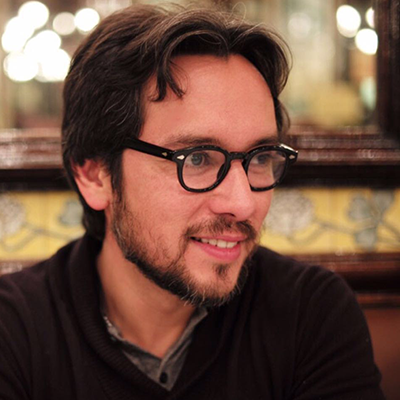“I came out as bisexual to my younger brother when I started college and he was very supportive. I was living at home at the time and had just broken up with a younger guy. I had a pager which I forgot at home when I went to work. This guy was paging me non-stop and my mother saw his messages,” remembers Genaro. “My father took about six months to accept my sexual orientation and my mom took longer, almost a year. She was frustrated that I had girlfriends while also dating guys.”
Today, Genaro is a seasoned activist and chronicler of the ever-changing landscape of LGBTI rights in Mexico. He hosts the popular talk show “Sin Filtro” on FOROtv where he covers national and international politics and their intersections with the global LGBTI struggle.
Between his accidental coming out and life today Genaro worked at an NGO focused on governmental transparency, earned a PhD in Politics from the New School in New York, worked as a speechwriter for Mexico’s Minister of Foreign Affairs, and worked his way up to being an editor at Mexico City’s most influential daily newspaper, Reforma.
This multi-faceted engagement with civil society and government has been invaluable to his understanding, and ability to explain, the complicated path for LGBTI rights in his country.
Today’s headlines are filled with stories of the patchwork struggle for marriage equality in Mexico. In some ways the current battles are reminiscent of the individual, state-level victories and setbacks that led to the 2015 Supreme Court decision in the United States. But Mexico’s Supreme Court issued their decision in 2010 mandating that Mexico City’s 2006 marriage equality statute apply in all areas of the country. Since that time 10 of Mexico’s 31 states have legalized same-sex marriage, with challenges currently underway in several others. On top of these state-level efforts, President Enrique Peña-Nieto proposed legislation to amend the national constitution and allow marriage equality immediately. The legislation was not taken up by the Congressional leadership of his own party, the PRI, and its fate remains in question.
“There will be no progress until after Peña-Nieto’s term in 2018, and then only if we can elect a president from the left,” notes Genaro. “The problem with this strategy is that the perennial candidate of the liberal PRD (Party of the Democratic Revolution), Andrés Manuel López Obrador, has already lost two presidential elections in 2006 and 2012. He is currently leading in the polls, but he is very socially conservative taking stances against abortion and marriage equality.”
The recent progress on marriage equality is emblematic of larger cultural changes where young, urban Mexicans are more demanding of their basic human rights. In smaller cities and rural areas, which many younger people have left for better economic opportunities, older populations are susceptible to the growing activism of the Catholic Church and other religious denominations in opposition to progressive social change.
In the past few weeks there have been mass protests across the country organized by the evangelical organization “National Front for the Family”. In response, LGBTI rights organizations led by MOViiMX and FONMX met in the city of Cuernavaca to create a statement demanding the government respect the rights of LGBTI Mexicans and organized a counter-protest in Mexico City.
Genaro foresees “a stronger future as LGBTI people organize across the country and in media. The main fear is a backlash on sexual and reproductive rights. Eighteen states have right to life laws where women are being jailed for having abortions. In schools the right is challenging education on sexual health and reproductive rights.” He finds inspiration in the Zapatista rebellion of the 1990s where demands for essential rights of indigenous Mexicans led to important reforms. “Six years after the Zapatista rebellion the first lesbian was elected to Congress. Recognizing the rights of indigenous people opened the door for recognition of rights of other marginalized people including the LGBTI community.”

